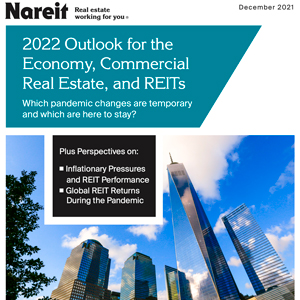By John Worth, Executive Vice President, Research & Investor Outreach, Nareit
As the calendar flips to 2022, the world will have endured nearly two years of COVID-19. While there are hopeful signs for a return to normalcy in 2022, recent days have also brought the unhappy possibility of more health-related uncertainty, which may continue economic and social disruption. In this outlook, Nareit’s research team provides perspectives on the past 22 months and an outlook for the next 12 to 18 months.
Despite the challenges of COVID-19, 2021 has been a successful year for REITs and REIT investors as the hard-hit, social distancing-sensitive sectors have recovered from 2020 and the digital economy sectors have continued to thrive. As of Dec. 1, 2021, REITs are up nearly 29% for the year with strong performance across sectors. REIT stock total returns since the onset of the pandemic are now in excess of 20%.
The robust recovery speaks both to the unique nature of the COVID-19 crisis for real estate and to the resilience of REITs. Entering the crisis with strong balance sheets and operating performance, REITs and their management teams were able to adapt to the rapidly changed environment creating the conditions for a successful recovery. The stock price recovery has resulted in REITs issuing equity and debt in nearly equal proportions in 2021, fueling property acquisitions that will support future earnings growth. In 2021, there has been important M&A activity, including three data center REIT acquisitions, as both REITs and private funds increase exposure to digital economy real estate and REIT-to-REIT deals that should drive growth through the strategic merging of complementary portfolios.

2022 Outlook for the Economy, Commercial Real Estate, and REITs
In 2022, there will likely be further improvement in overall economic conditions, with rising GDP, job growth, and higher incomes, in a supportive financial market environment where inflation pressures gradually subside and long-term interest rates remain well below their historical norms.
Assuming COVID-19 variants remain largely in check, this will be a period of economic growth that will drive recovery across a broad range of real estate and REIT sectors. As Nareit’s Calvin Schnure summarizes, the coming year is likely to see significant further improvement in overall economic conditions, with rising GDP, job growth, and higher incomes, in a supportive financial market environment where inflation pressures gradually subside and long-term interest rates remain well below their historical norms.
As we hopefully transition out of this period of human loss and economic and social upheaval, the Paul Simon lyric “nothing is different, but everything’s changed” resonates. Schnure’s outlook considers what we can infer about which of the dramatic changes we have experienced in how we interact with real estate and the built environment are permanent and which are temporary. Most critically, he considers how the increasing digitization of shopping may impact retail and how the future of office use may evolve as firms return to the office and experiment with hybrid and work-from-home arrangements.

Inflationary Pressures and REIT Performance
Inflationary pressure to the macroeconomy from the effects of supply chain interruptions will likely lead to moderate inflation levels over the next year, rising above the Fed’s target of 2.5% but likely well below historically high levels seen in the 1970s and early 1980s. For investors looking for inflation protection in their portfolio, REITs have historically performed well during periods of moderate inflation in terms of market returns and operating fundamentals.
Another topic of widespread discussion during Nareit’s interactions with investors during the latter half of 2021 has been the potential threat of inflationary pressures as the economy works through supply chain challenges. Nareit’s Nicole Funari showcases research on how both REITs’s stock returns and operational performance have historically performed well during periods of high and moderate inflation. This provides further evidence that REITs can provide effective inflation protection in a diversified portfolio.

Global REIT and Listed Real Estate Performance During the Pandemic
Like other equity investments, REITs and publicly-listed real estate around the world were hit hard by the onset of the COVID-19 pandemic, but have generally rebounded strongly with the development of therapeutics to fight the virus. Not all property sectors or regions were impacted as negatively, nor have they bounced back uniformly. Today, there are 40 countries and regions with REIT regimes and 40 countries with REITs or listed real estate represented in the FTSE EPRA/Nareit Global Index providing a wide geographic distribution of real estate returns.
Of course, COVID-19 was a global crisis and the real estate effects were felt worldwide. Nareit’s John Barwick reviews global returns across the crisis highlighting index product enhancements Nareit has recently implemented as well as examining the role government policies and different real estate sector concentrations have played in driving regional returns.
As a final note, in a year where crypto coins, decentralized finance, and NFTs have hit the mainstream, I frequently reflect that for over 60 years, we have enjoyed a successful system of distributed, low-cost, fractionalized ownership of real property—without blockchain—the REIT system. As a measure of that success, today 145 million Americans enjoy the benefits of commercial real estate in their portfolios through the use of REITs and nearly half the population of the earth lives in a region or nation with REITs.
In 2022, Nareit’s Research and Investor outreach Outreach team will continue to research and communicate the benefits of REITs in a diversified portfolio, and we wish you a healthy and successful year.
